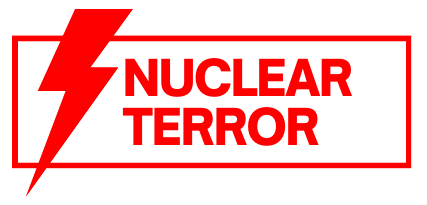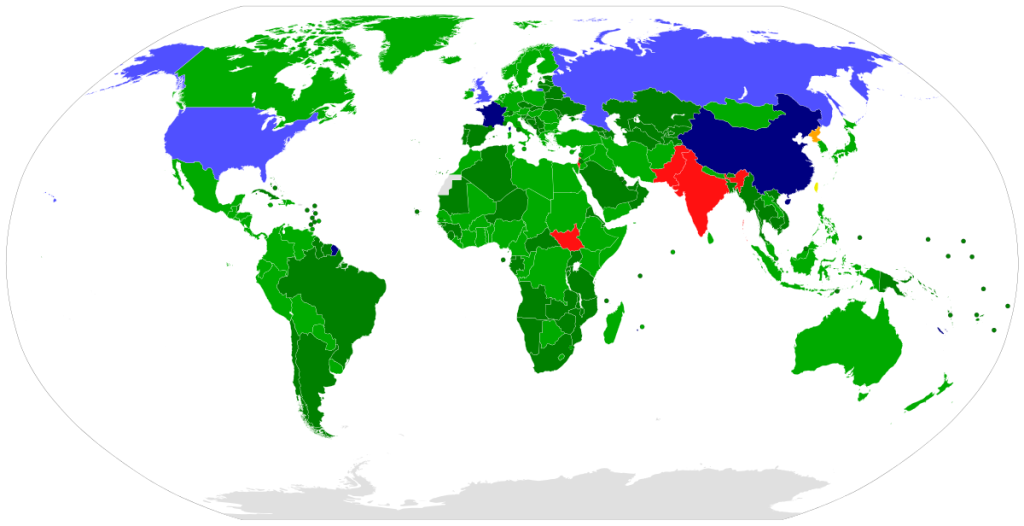They say that “actions speak louder than words,” and when it comes to enforcing the Nuclear Non-Proliferation Treaty (NPT), this adage holds true. The NPT, established in 1970, serves as a crucial international agreement aimed at preventing the proliferation of nuclear weapons. But who exactly enforces this treaty? As you delve into this discussion, you will discover the key players involved in ensuring compliance, the challenges they face, and the future of nuclear non-proliferation. So, let’s unravel the complexities of NPT enforcement and explore the implications it holds for global security.
Background and Significance of the NPT
The Nuclear Non-Proliferation Treaty (NPT), established in 1970, is a globally supported arms limitation treaty designed to prevent the spread of nuclear weapons. The treaty has been effective in curbing the proliferation of nuclear weapons by establishing a global norm against their acquisition. The International Atomic Energy Agency (IAEA) plays a crucial role in verifying compliance with the treaty by conducting inspections and monitoring nuclear programs. The UN Security Council is responsible for enforcing the treaty and imposing consequences on parties found to be in noncompliance. While there have been cases of noncompliance, such as Iraq, Libya, and North Korea, the treaty has had some success in preventing the development of nuclear weapons. The consequences for cheating act as a deterrent, making compliance the default position. Despite its imperfections, the NPT still holds value in discouraging nuclear proliferation and promoting international cooperation in the pursuit of disarmament. However, the recent actions of Iran and North Korea, as well as the potential development of nuclear weapons by Saudi Arabia and other countries, pose challenges to the treaty’s effectiveness. Efforts should be made to address these concerns and strengthen the enforcement mechanisms of the treaty to ensure its continued success in preventing nuclear proliferation.
Compliance Verification by the IAEA
Compliance verification by the International Atomic Energy Agency (IAEA) is a critical component of the Nuclear Non-Proliferation Treaty (NPT) in ensuring that parties adhere to their obligations and commitments. The IAEA verification process plays a significant role in preventing the development of nuclear weapons and upholding nonproliferation norms. Here are three key aspects of IAEA verification:
- Inspections and Safeguards: The IAEA conducts regular inspections of nuclear facilities to verify that states are not diverting nuclear materials for military purposes. These inspections involve verifying the accuracy of states’ declarations and ensuring the integrity of their nuclear programs. Safeguards agreements with states help establish the necessary framework for these inspections.
- Information Exchange and Reporting: The IAEA relies on a robust system of information exchange to gather data on states’ nuclear activities. Member states are required to provide regular reports on their nuclear programs, including information on nuclear material inventory, research activities, and nuclear-related exports. This transparency helps promote trust and confidence among states.
- Treaty Enforcement Mechanisms: The IAEA’s verification activities serve as a strong deterrent against noncompliance with the NPT. In cases of suspected noncompliance, the IAEA can escalate its investigations and report to the UN Security Council. The Security Council, in turn, has the authority to take appropriate measures to address noncompliance, including imposing sanctions.
Through its verification activities, the IAEA plays a crucial role in preventing the development of nuclear weapons and upholding the nonproliferation norms established by the NPT. It fosters dialogue among states, promotes transparency, and ensures that parties fulfill their obligations under the treaty.
Enforcement by the UN Security Council
After examining the critical role of compliance verification by the International Atomic Energy Agency (IAEA) in upholding the Nuclear Non-Proliferation Treaty (NPT), it is important to now shift our focus to the enforcement efforts carried out by the UN Security Council. The UN Security Council plays a crucial role in enforcing the NPT and ensuring that countries comply with their obligations.
The table below provides a visual representation of the key aspects related to the enforcement of the NPT:
| Role of the UN Security Council in enforcement | Role of the IAEA in compliance verification | Impact of noncompliance on the NPT | Consequences for countries caught cheating | Strategies for strengthening the NPT |
|---|---|---|---|---|
| – Responsible for maintaining international peace and security | – Verifies compliance with the NPT through inspections and monitoring | – Undermines the credibility and effectiveness of the NPT | – Imposition of sanctions and diplomatic pressure | – Strengthening verification measures and increasing transparency |
| – Can impose sanctions and other measures on non-compliant states | – Reports non-compliance cases to the UN Security Council | – Raises concerns about the intentions and trustworthiness of non-compliant states | – Reputation damage and loss of credibility in the international community | – Enhancing international cooperation and information sharing |
| – Can authorize the use of force to enforce compliance | – Assists states in strengthening their safeguards and monitoring capabilities | – Increases the risk of nuclear proliferation and instability | – Loss of benefits and privileges associated with the NPT | – Promoting disarmament and reducing the reliance on nuclear weapons |
| – Facilitates diplomatic negotiations and dialogue between parties | – Provides technical assistance and expertise in nuclear safeguards | – Leads to a breakdown of trust and cooperation among states | – Increased scrutiny and monitoring by the international community | – Strengthening the NPT review process and addressing gaps in implementation |
| – Works towards the peaceful resolution of disputes related to the NPT | – Cooperates with non-nuclear weapon states to promote peaceful uses of nuclear energy | – Undermines the global non-proliferation regime | – Isolation and diplomatic pressure from the international community | – Encouraging universal adherence to the NPT and promoting disarmament efforts |
The UN Security Council’s enforcement efforts are crucial for maintaining the integrity and effectiveness of the NPT. Noncompliance with the treaty undermines its credibility and poses significant risks to international peace and security. Therefore, it is essential to strengthen the NPT by enhancing verification measures, imposing consequences on countries caught cheating, and promoting disarmament efforts. Through these strategies, the international community can work towards preventing the spread of nuclear weapons and ensuring a safer world.
Concerns and Challenges to the NPT
One of the major concerns and challenges facing the Nuclear Non-Proliferation Treaty (NPT) is the potential withdrawal of certain countries, which undermines its effectiveness in preventing the spread of nuclear weapons. There are several key issues that contribute to these concerns and challenges:
- NPT withdrawal: The withdrawal of countries from the NPT weakens the treaty and undermines its purpose of preventing the proliferation of nuclear weapons. When countries withdraw, they are no longer bound by the treaty’s obligations and safeguards, which increases the risk of nuclear weapons development.
- Regional security threats: The potential development of nuclear weapons by countries in response to regional security threats poses a significant challenge to the NPT. As countries perceive threats to their security, they may seek to acquire nuclear weapons as a deterrent, further complicating the non-proliferation efforts.
- Nuclear treaties expiration: The expiration of important nuclear treaties, such as the Intermediate Nuclear Forces Treaty and the Strategic Arms Reduction Treaty, could weaken the overall framework of non-proliferation efforts. These treaties play a crucial role in arms control and disarmament, and their expiration could create a power vacuum and undermine the effectiveness of the NPT.
In order to address these concerns and challenges, it is crucial to strengthen the enforcement mechanisms of the NPT. This includes enhancing the verification and compliance procedures, imposing stricter consequences for noncompliance, and promoting dialogue among nuclear and non-nuclear states. By reinforcing the treaty and addressing these issues, the international community can work together to prevent the spread of nuclear weapons and ensure the long-term effectiveness of the NPT.
Reasons for Optimism About the NPT
The challenges and concerns facing the Nuclear Non-Proliferation Treaty (NPT) are significant, but there are reasons to be optimistic about its future effectiveness. Strengthening the global norm against proliferation through a nuclear abstinence approach is a promising strategy. The NPT has had some success in preventing the development of nuclear weapons, as seen in cases like Iraq, Libya, and North Korea. Noncompliance does not render the treaty irrelevant, as there are consequences for cheating that act as a deterrent.
| Reasons for Optimism About the NPT |
|---|
| Strengthening norm against proliferation through nuclear abstinence approach |
| Success in preventing nuclear weapons development in cases like Iraq, Libya, and North Korea |
| Consequences for cheating act as a deterrent |
While there are challenges and concerns, such as potential withdrawals from Iran and North Korea, and the possible development of nuclear weapons by Saudi Arabia and other regional states, the international community must reinforce the treaty and address noncompliance concerns. Efforts should be made to strengthen the treaty’s enforcement mechanisms and promote dialogue among nuclear and non-nuclear states. The NPT’s value in discouraging nuclear proliferation should not be underestimated, despite its imperfections. By working together, the international community can reinforce the treaty and prevent the spread of nuclear weapons.
Future Challenges for the NPT
Future challenges for the Nuclear Non-Proliferation Treaty (NPT) lie in addressing the concerns raised by noncompliance and potential withdrawals, while reinforcing enforcement mechanisms and promoting dialogue among states. These challenges include:
- Potential withdrawals: The threat of withdrawal from the NPT by countries like Iran and North Korea undermines the effectiveness of the treaty. The international community must find ways to address their concerns and encourage their continued participation.
- Regional proliferation threats: The potential development of nuclear weapons by countries like Saudi Arabia and other regional states in response to security threats poses a challenge. Efforts should be made to address these regional concerns and find diplomatic solutions.
- Treaty expiration: The possible expiration of important nuclear treaties, such as the Intermediate Nuclear Forces Treaty and the Strategic Arms Reduction Treaty, could weaken the overall framework of non-proliferation efforts. The international community should work towards renewing and reinforcing these treaties to maintain their effectiveness.
To tackle these challenges, the international community needs to reinforce the NPT and its enforcement mechanisms. Dialogue among nuclear and non-nuclear states is crucial in addressing concerns and finding common ground. By strengthening the treaty, addressing noncompliance, and promoting dialogue, the NPT can continue to play a vital role in preventing the spread of nuclear weapons.
Outlook for the NPT
Addressing the challenges posed by noncompliance and potential withdrawals, the outlook for the Nuclear Non-Proliferation Treaty (NPT) hinges on reinforcing enforcement mechanisms and promoting dialogue among states. Strengthening enforcement is crucial to prevent nuclear proliferation and maintain the integrity of the treaty. This can be achieved by enhancing the role of the International Atomic Energy Agency (IAEA) in verifying compliance and imposing consequences on parties that violate the treaty. Additionally, promoting dialogue among states is essential to address the concerns raised by noncompliance and potential withdrawals. Open and constructive discussions can help build trust and foster cooperation in the pursuit of nuclear disarmament and nonproliferation. The future prospects of the NPT depend on the international community’s commitment to reinforcing the treaty and preventing the spread of nuclear weapons. Despite its imperfections, the NPT still holds value in discouraging nuclear proliferation and creating a global norm against the acquisition of nuclear weapons. By addressing the challenges it faces and actively working towards strengthening enforcement and promoting dialogue, the NPT can continue to play a vital role in maintaining global peace and security.

